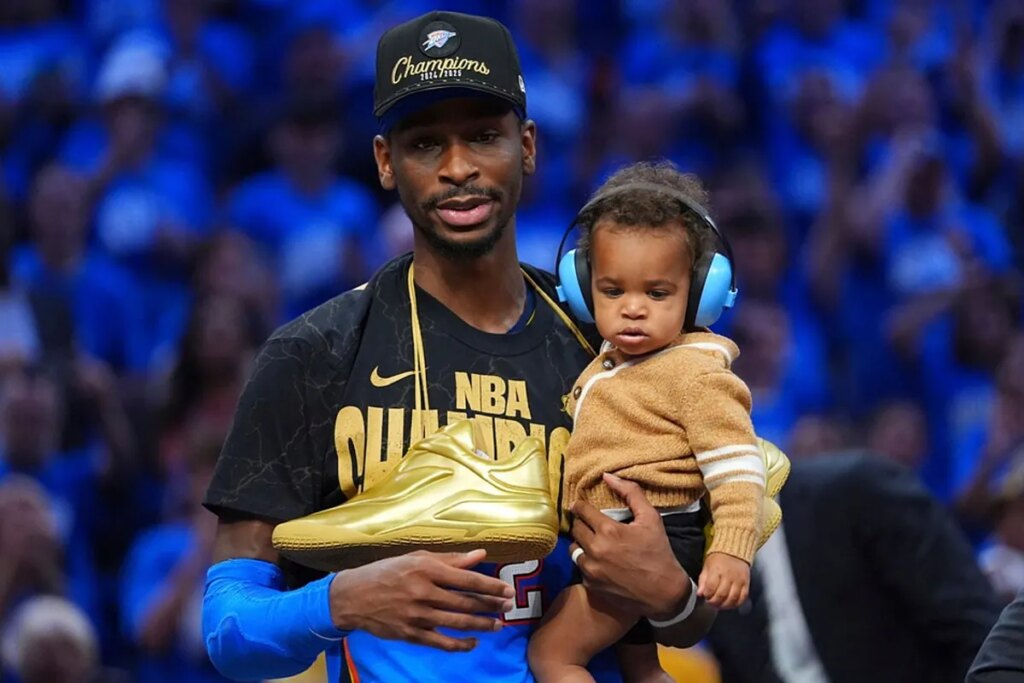Shai Gilgeous-Alexander not only made history on a collective level with the Oklahoma City Thunder as the franchise won the NBA Finals championship for the first time in its history with a 103-91 victory over the Indiana Pacers.
Gilgeous-Alexander not only won a championship with OKC, he also made individual history. The Thunder star became the fourth player in history to win the regular-season MVP, the Finals MVP, and be the league’s leading scorer in the same year.
Before him, Michael Jordan achieved it four times, in 1991, 1992, 1996, and 1998. Before him, the legendary Kareem Abdul-Jabbar achieved it in 1971, and the most recent to do so was Shaquille O’Neal in 2000. But “King” James is still excluded from this select group.
The Oklahoma City Thunder took control of Game 7
The Oklahoma City Thunder took control of Game 7 of the NBA Finals against the Indiana Pacers starting in the third quarter, when they were down by one point (48-47) and won that period 34-20 for a score of 81-68, which they did not lose any more in the game to be crowned for the first time in their history with a final score of 103-91.
The Oklahoma City Thunder relied on their collective play and had their best players in Game 7 of the NBA Finals i. Shai Gilgeous-Alexander, Luguentz Dort, Jalen Williams, Cason Wallace, Chet Holmgren and others.
MVP in the regular season and MVP in the NBA Finals
For the first time in 25 years, the same player who won the Most Valuable Player Award (MVP) in the regular season is also the MVP in the NBA Finals: Shai Gilgeous-Alexander that neither Michael Jordan nor LeBron James ever achieved.
The Oklahoma City Thunder joined to
The Oklahoma City Thunder joined the Denver Nuggets (2023), Toronto Raptors (2019), Cleveland Cavaliers (2016), Dallas Mavericks (2011), Washington Bullets (1978), St. Louis Hawks (1958), Rochester Royals (1951), Portland Trail Blazers (1977), and Baltimore Bullets (1948) as NBA Finals champions for the first time in their history.
List of all NBA champions
- 1950 Minneapolis Lakers
- 1951 Rochester Royals
- 1952 Minneapolis Lakers
- 1953 Minneapolis Lakers
- 1954 Minneapolis Lakers
- 1955 Syracuse Nationals
- 1956 Philadelphia Warriors
- 1957 Boston Celtics
- 1958 St. Louis Hawks
- 1959 Boston Celtics
- 1960 Boston Celtics
- 1961 Boston Celtics
- 1962 Boston Celtics
- 1963 Boston Celtics
- 1964 Boston Celtics
- 1965 Boston Celtics
- 1966 Boston Celtics
- 1967 Philadelphia 76ers
- 1968 Boston Celtics
- 1969 Boston Celtics
- 1970 New York Knicks
- 1971 Baltimore Bullets
- 1972 Los Angeles Lakers
- 1973 New York Knicks
- 1974 Boston Celtics
- 1975 Golden State Warriors
- 1976 Boston Celtics
- 1977 Portland Trail Blazers
- 1978 Washington Bullets
- 1979 Seattle SuperSonics
- 1980 Los Angeles Lakers
- 1981 Boston Celtics
- 1982 Los Angeles Lakers
- 1983 Philadelphia 76ers
- 1984 Boston Celtics
- 1985 Los Angeles Lakers
- 1986 Boston Celtics
- 1987 Los Angeles Lakers
- 1988 Los Angeles Lakers
- 1989 Detroit Pistons
- 1990 Detroit Pistons
- 1991 Chicago Bulls
- 1992 Chicago Bulls
- 1993 Chicago Bulls
- 1994 Houston Rockets
- 1995 Houston Rockets
- 1996 Chicago Bulls
- 1997 Chicago Bulls
- 1998 Chicago Bulls
- 1999 San Antonio Spurs
- 2000 Los Angeles Lakers
- 2001 Los Angeles Lakers
- 2002 Los Angeles Lakers
- 2003 San Antonio Spurs
- 2004 Detroit Pistons
- 2005 San Antonio Spurs
- 2006 Miami Heat
- 2007 San Antonio Spurs
- 2008 Boston Celtics
- 2009 Los Angeles Lakers
- 2010 Los Angeles Lakers
- 2011 Dallas Mavericks
- 2012 Miami Heat
- 2013 Miami Heat
- 2014 San Antonio Spurs
- 2015 Golden State Warriors
- 2016 Cleveland Cavaliers
- 2017 Golden State Warriors
- 2018 Golden State Warriors
- 2019 Toronto Raptors
- 2020 Los Angeles Lakers
- 2021 Milwaukee Bucks
- 2022 Golden State Warriors
- 2023 Denver Nuggets
- 2024 Boston Celtics
- 2025 Oklahoma City Thunder
Read the full article here

